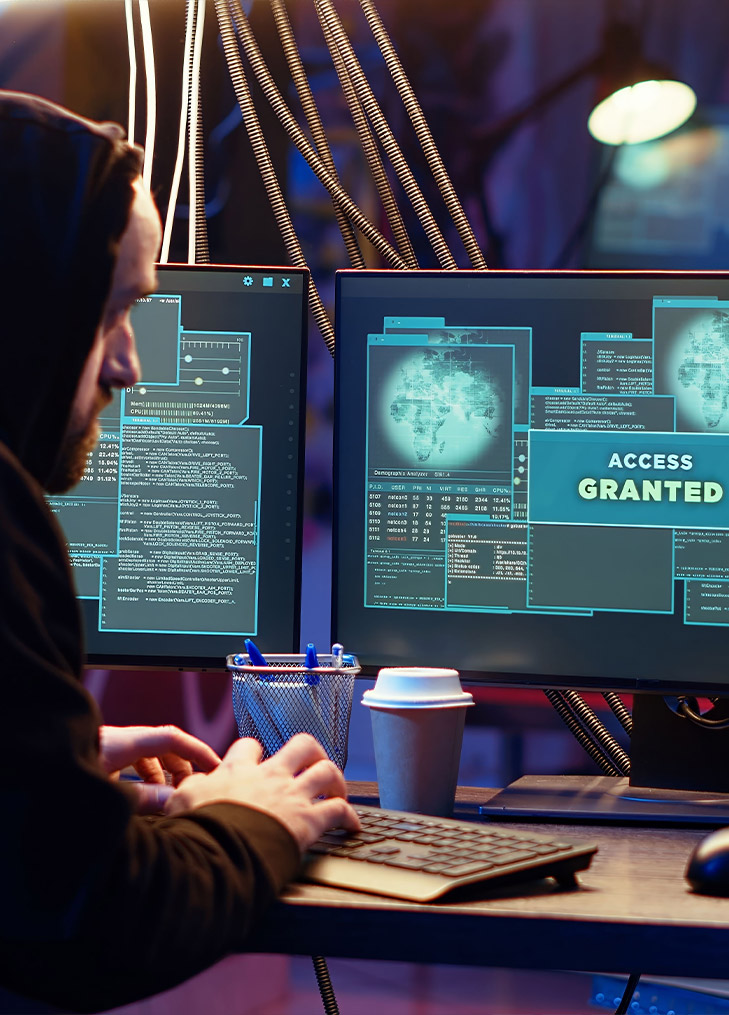Additional Links
- Criminal Lawyers With Payment Plans
- Missouri Revised Statutes
- Missouri Criminal Defense Resources
- Legal Books
- Defending Freedom Podcast
- Legal Videos
- Can Police Search My Phone?
- Top Reasons You Need a Criminal Defense Lawyer
- Probable Cause: Police Searches and the 4th Amendment
- Dos and Don’ts when Interacting with the Police

What Is Unauthorized Access and Computer Tampering in Missouri?
As technology and the information economy developed, computer crimes developed with them. In the late 1990s and early 2000s, states began passing laws against acts like hacking, computer theft, and denial of service attacks.
Although investigative techniques improved, sophisticated criminals found ways to hide or even point the finger at innocent victims. As a result, computer crime charges, such as unauthorized access and computer tampering, are often difficult to investigate and prove.
We handle cases like your every day. Reach out to our St. Louis unauthorized access and computer tampering lawyers now at (314) 900-HELP.

Unauthorized Access and Computer Tampering Statutes in Missouri
The Missouri Revised Statutes include several laws covering computer crimes, including the following:
Tampering With Computer Data
Tampering with computer data charges are directed at actions usually referred to as “hacking.” They can also cover the intentional installation of a virus, bot, or spyware on someone else’s computer system.
This offense can happen in several ways, including:
- Modifying or destroying data or software in a computer, system, or network
- Modifying or destroying data, software, or documentation outside a computer, system, or network
- Disclosing or stealing data, software, or documentation
- Disclosing or stealing passwords, ID codes, PINs, or other confidential information for controlling computer system or network access
- Accessing a computer, system, or network to intentionally examine personal data
- Receiving, retaining, using, or disclosing data in violation of these provisions
These offenses are independent. Thus, prosecutors can file charges for tampering with computer data if you copy and use your boss’s password without taking, modifying, accessing, or disclosing any data, software, or other information.
Tampering With Computer Equipment
Tampering with computer equipment charges relate to physical interference with computers, storage devices, or network equipment. Prosecutors can pursue these charges when they believe someone has committed any of the following acts:
- Modifying, destroying, damaging, or taking equipment or data storage devices
- Modifying, destroying, damaging, or taking any computer, system, or network
These charges are equivalent to theft, vandalism, or criminal mischief directed at computers, network equipment, or data storage devices. Prosecutors might bring computer equipment tampering charges rather than theft when the accused intended to commit fraud rather than obtain property.
For example, suppose that prosecutors accuse you of installing a credit card skimmer on a gas pump’s payment system. They could file tampering charges for modifying the gas station’s equipment even if they can’t prove that you stole any money.
Tampering With Computer Users
Charges of tampering with computer users expand on the tampering with computer data offense.
To tamper with computer data, prosecutors must prove that you hacked into a system to take, modify, destroy, examine, or disclose the system’s data. By contrast, tampering with computer users simply requires accessing a system or blocking access to the system’s services without authorization.
Consequently, tampering with computer users occurs whenever someone hacks into a system, regardless of their purpose. The mere act of unauthorized access violates this statute.
Defenses Against Unauthorized Access and Computer Tampering Charges in St. Louis, MO
Your St. Louis unauthorized access and computer tampering lawyer might raise any of several defenses, depending on your situation. Some possible criminal defense strategies in these cases include:
Lack of Intent
Most criminal statutes require prosecutors to prove a culpable state of mind. This requirement can prevent the prosecution of someone who accidentally violates these criminal laws.
All three computer crime laws require the accused to act knowingly. On the scale of culpable states of mind, “knowingly” falls below “intentionally” and above “recklessly.” In other words, “knowingly” generally excludes inadvertent acts. Instead, prosecutors must show that you had one of the two following states of mind:
- You were aware of the nature of your actions or the existence of the circumstances in the statute
- You knew that your actions would cause the prohibited result
For example, tampering with computer data requires you to knowingly damage or destroy data in a computer network. Suppose that you get arrested for destroying data using a virus. A Missouri criminal defense attorney can argue that you didn’t knowingly destroy the data because you didn’t know the email attachment you opened contained a virus.
Permission
State and federal computer crime statutes require you to act without authorization and without reasonable grounds to believe you had authorization. In other words, the laws specify that the computer, network, or system wasn’t your sole property, and you didn’t have permission from the owner or their representative to perform the prohibited act.
You have the authority to damage or destroy data on your devices. You can also damage or destroy devices you own. Thus, a lawyer can often overcome this charge by showing you owned the data or device allegedly damaged or destroyed.
You may also have permission from the owner or the owner’s representative, such as a supervisor. A St. Louis computer tampering lawyer can therefore defend you using a memo, email, or text from someone telling you to remove or destroy the data or equipment.
Reasonable Mistake of Fact
All three computer crime statutes require prosecutors to prove that you acted without reasonable belief that you had authorization. If you don’t have proof that you received permission, your lawyer can still defend you by showing that you reasonably believed you had authorization to perform the alleged tampering.
For example, suppose that your password to a particular network didn’t give you access to certain data, but your boss allowed you to use their password to perform some task.
Based on these circumstances, you might have reasonably believed you had the authority to use your boss’s password to access data any time you needed to do so and that you didn’t need to get permission every time.
Let’s say your boss takes the position that you don’t have the authority to change or destroy data outside your network permissions. If you get arrested because certain data was damaged or destroyed, you can raise the defense that you reasonably believed you had permission because of your boss’s prior actions.
Mistaken Identity
Prosecutors often face difficulties proving computer crimes committed remotely.
Even if they trace an offense to your IP address, they might not have proof that you committed the crime. It could have been someone else in your home using your device, such as a roommate or child. It might even have been someone who remotely hacked into your device and used your IP address to commit the crime.
Similarly, imagine that prosecutors accuse you of illegally accessing or stealing data from your employer based on the credentials used. You could raise the defense that a co-worker or contractor might have stolen your login and password or that someone might have accessed your computer while you were away from your desk.































